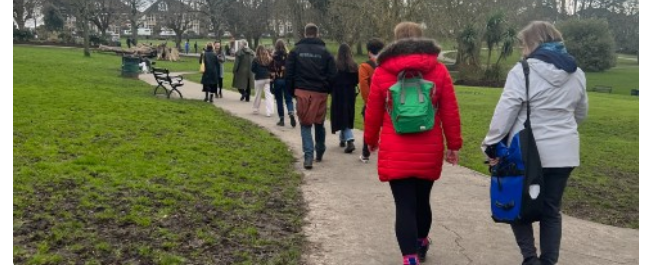Goal 11: Sustainable cities and communities
Make cities and human settlements inclusive, safe, resilient and sustainable
Our research
Cities are growing at an unprecedented rate, putting overwhelming pressures on exploited land, scarce resources, and fragile ecosystems. Researchers from the universities of Bristol, Oxford and Yale have proposed a new global Urban Science advisory system to address the alarming impacts of urban expansion. This system would fulfil a similar function as the Intergovernmental Panel on Climate Change (IPCC) does for climate change and would work in tandem with the UN General Assembly to highlight relevant issues and put the latest information on the transformative impact of urban growth on policy makers’ radars.
Researchers from the Bristol Poverty Institute and the Cabot Institute City Futures theme held an interactive workshop on the topic of socially just future cities, in order to provide space for new research connections. The event explored topics around a just transition and leaving no one behind, and how this intersects with issues including health, city planning, and the importance of systems thinking when addressing issues of sustainability to avoid unintended consequences for those experiencing or at risk of poverty. It touched on many aspects of everyday life including energy and transport poverty, access to white goods, and food options. It was followed by breakout discussions to explore questions such as “what would a socially just transition in Bristol look like?”.
Our students
Students are a vital part of the local community and we take pride in the value that our students bring to Bristol, whether it is through voluntary activity, collaborative initiatives or enrichment of the diversity and culture of the city. However, we also recognise that there can be challenges around integrating students with the wider population and our Bristol Student Community Partnership was established to promote student and community relations and cohesion. In 2024, discussions in this Group included the Students on the Move campaign to reduce waste as students move out, and Bristol City Council’s new tenant information pack which has relevant information for students renting privately.
Second year undergraduate students in the Department of Theatre taking the Applied Theatre unit undertake community engaged learning projects which bring them together with external partners. The students worked with Travelling Light Theatre Company to design, publicise and deliver a Free Family Theatre Day for local families. With further support and input from Bristol Refugee Rights, and the University’s Barton Hill Micro-Campus Little Library, they designed and delivered a series of creative workshops and performances for children and their families living in the Lawrence Hill neighbourhood.
Our communities
Expert voices from planning, health, government and consultants shared their insights of using Health Impact Assessments as a force for good to create healthier new communities in a series of eight films. As part of the TRUUD (Tackling the Root causes Upstream of Unhealthy Urban Development) research programme, participants looked at their own experiences of embedding requirements for Health Impact Assessments in their local plans and shared positive impacts and what could be improved. The films included contributions from officers at five councils, planning consultants, the Office for Health Improvement and Disparities and the Local Government Association.
In developing and delivering environmental policy, local authorities need to act within national legislation while also supporting the needs of the communities they serve. This two-way tension is evident in the words used in formal communications and policy documents, which are frequently loaded with technical meaning or have specific definitions that may not be known to most. University of Bristol researchers and PolicyBristol developed a policy research briefing on ways to include community groups and businesses on climate policy development, in particular on how to value lived experience and be guided by local practitioner knowledge. These briefings aim to make research more accessible to users beyond academic so that it can shape and inform policy.

Ourselves
As part of our Cleaner Fleet Programme, we have committed to reduce emissions and the environmental impact of our vehicles. Following an investment of over £1.5 million, as of 2024 we have 44 all-electric vans and eight hybrid election vehicles out of a total of around 90 road vehicles. Installing the necessary charging infrastructure is also a critical and complex step. This requires collaboration across multiple teams to ensure that each charging point aligns with operations needs and can connect with our digital systems to provide real-time energy monitoring. Twenty-nine charge points have been installed across the estate, providing 57 connectors - sufficient capacity for our current fleet, with room for future growth.
Opening in 2026, our Temple Quarter Enterprise Campus (TQEC) will enhance connections with industry and civic organisations to co-create solutions to the most pressing challenges facing our society. A group of Bristol-based artists were selected to lead Charting Change – a two-year, participatory public art commission. Led by artist Ellie Shipman in collaboration with the Dhaqan Collective – a Somali feminist art collective – and artist Jack Stiling, the project explores the industrial histories of the site alongside its technological futures and will culminate in a permanent artwork inside the main TQEC building.
